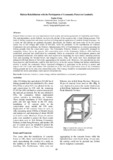Habitat Rehabilitation with the Participation of Community Fishers in Cambodia
Abstract
Natural fishery resources are very important for food security and income generation of Cambodian rural fishers. The high dependence on the fisheries has led to the decline of the resources due to high fishing pressure. This leads to fishing competition and causes conflicts in fishing and the application of modern fishing techniques. As a result, the fish habitats are gradually degraded. Specifically, the shallow and warm water in the dry season causes loss of fish refuges and results in fish kills, while the potentials of fish reproduction are reduced. Confronted with such problems, the Fisheries Administration (FiA) of Cambodian has set criteria separating the fishing grounds from the conservation areas. The Community Fisheries domain is responsibly managed by community fishers. Up to the present, 364 conservation areas of the Community Fisheries (CFi) had been established, protected and rehabilitated by community fishers in cooperation with development partners and governmental institutions. Fish habitats have been improved by deepening the water bodies, installing artificial reefs and replanting the flooded forests and mangrove areas. Thus, fish stocks have been maintained and enhanced with high density of fish stocks aggregating at the installed reefs. Moreover, fish reproduction has also been improved and broodstocks could be kept and survive in the dry season. Finding that habitat rehabilitation activity is useful, the community fishers expressed willingness to participate in the activity to protect and improve the fish stocks and enhance fish reproduction in the 364 fish conservation areas of the community fishing grounds and in the state-own conservation areas. This strategy should be recommended and promoted to maintain fish stocks and enhance multi-species fish production.
Citation
Lieng, S. (2016). Habitat rehabilitation with the participation of community fishers in Cambodia. In H. Kawamura, T. Iwata, Y. Theparoonrat, N. Manajit, & V. T. Sulit (Eds.), Consolidating the Strategies for Fishery Resources Enhancement in Southeast Asia. Proceedings of the Symposium on Strategy for Fisheries Resources Enhancement in the Southeast Asian Region, Pattaya, Thailand, 27-30 July 2015 (pp. 97-98). Samutprakan, Thailand: Training Department, Southeast Asian Fisheries Development Center.

